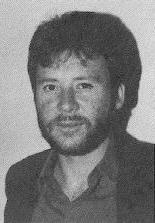Biography: Byron Kennedy
producer
Biography |
Quotes |
Tribute
Byron Kennedy's
filmography at the Internet Movie Database
 In 1971, Byron Kennedy met George Miller, a fellow student at the
Melbourne Film Workshop. In 1972, they made Violence in the Cinema
- Part One, a 15-minute parody of that era’s violent films. It won two
Australian Film Institute Awards and was presented at various
film festivals around the world. Subsequently, they formed Kennedy Miller, a film
production company.
In 1971, Byron Kennedy met George Miller, a fellow student at the
Melbourne Film Workshop. In 1972, they made Violence in the Cinema
- Part One, a 15-minute parody of that era’s violent films. It won two
Australian Film Institute Awards and was presented at various
film festivals around the world. Subsequently, they formed Kennedy Miller, a film
production company.
That same year, the Australian government began funding a film school to help develop the country's
then-small film industry. Byron Kennedy already had some film experience in the commercial realm.
"I didn't attend the film school, but a lot of people were invited to apply. The government
offered me a trip around the world instead of a position at the film school because they said that in terms
of basic craft I was too far advanced because I'd already run a small company and had been making movies anyhow. So they gave me the resources to travel to 15 countries to investigate distribution and
exhibition which were totally lacking in terms of knowledge in Australia at that stage. A lot of people
knew how to make movies but didn't have a clue what to do with it from that point on. So I went on this
trip and came back with a lot of facts and figures and Mad Max kind of evolved as a result of that
trip. I then set about to find the money privately, and at that point it was the most private money that
had ever been raised for a movie in Australia ($400,000)." (The government wasn't interested
in investing in the film.)
Meanwhile, Miller continued to work as a doctor and Kennedy as a cameraman.
Eventually, Mad Max became an international hit and won the Special Jury
Prize at France's Avoriaz Film Festival. Kennedy later produced The Road Warrior,
the successful 1981 sequel to Mad Max.
Tragically, Kennedy was killed in a helicopter crash in July 1983.
Byron Kennedy :
"I come from a tradition of science fact. I studied mathematics, etc., and I've been involved in
rocketry and was an amateur astronomer. In the past I was not very interested in science fiction. My
approach toward science is probably too clinical. By setting Mad Max in the future, it opened up
a whole new concept for me; a whole new way of approaching something from a sort of intellectual attack. It enabled us to put things in the movie that would speculate on what society would be like if there was little gasoline left and the police force was in terminal decay and so on. I've learned a lot by being involved in Mad Max to the point that it really changed my thinking on science fiction fairly radically. Where I was once kind of philosophically opposed to science fiction, I can now see its
relevance in science fact. I had thought that science fiction was just jerk-off time. Like I'd be working on
a mathematical calculation and someone's telling me that there are giant creatures orbiting Uranus that are gaseous and so on, one tends to be a bit dismissive of it. There's no foundation in fact. I think that's a problem with high schools in that the sort of education I had was too regimented and I was perhaps taught too clinically.
"Plus, in Australia, science fiction tends to be associated with what we call the rat-bag element,
like people who said they saw seven flying saucers go over the Sydney Harbor bridge and that gets the
spotlight and that becomes science fiction. It's kind of labeled and categorized by the media. It just
doesn't have the comprehension in Australia that it does in a large country like the U.S. where you have
all the broad diverse opinions. Australia is a small country."
"Byron was so extraordinary that it affected us in all ways --- in an extraordinary manner."
George Miller

 In 1971, Byron Kennedy met George Miller, a fellow student at the
Melbourne Film Workshop. In 1972, they made Violence in the Cinema
- Part One, a 15-minute parody of that era’s violent films. It won two
Australian Film Institute Awards and was presented at various
film festivals around the world. Subsequently, they formed Kennedy Miller, a film
production company.
In 1971, Byron Kennedy met George Miller, a fellow student at the
Melbourne Film Workshop. In 1972, they made Violence in the Cinema
- Part One, a 15-minute parody of that era’s violent films. It won two
Australian Film Institute Awards and was presented at various
film festivals around the world. Subsequently, they formed Kennedy Miller, a film
production company.